
Pirate or Privateer, Rogue or Hero?
| View previous topic :: View next topic |
| Author |
Message |
Salty Dog

Sailing Master 
Posts: 10060 



191991 Gold -

|
 Posted: Thu Dec 21, 2017 5:25 pm Post subject: Pirate or Privateer, Rogue or Hero? Posted: Thu Dec 21, 2017 5:25 pm Post subject: Pirate or Privateer, Rogue or Hero? |
 |
|
By Mark M. McMillin
American Privateers during the War of Independence
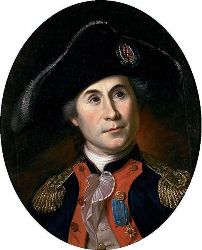
The Colonies, as much a maritime nation as Great Britain, embraced privateers early on to augment their fledgling Continental Navy. America’s newly-minted Congress legalized privateering on April 3, 1776 (two months prior to the Declaration of Independence). During the war, roughly 55,000 seamen served aboard nearly 1,700 American privateers at one time or another.
During America’s War of Independence who, among the Founding Fathers, formed his own private navy? Benjamin Franklin.
During America’s War of Independence, who was the most dangerous, the most successful privateer against Great Britain? An Irish smuggler named Captain Luke Ryan. Who the devil was Captain Luke Ryan?
Most of us have heard of John Paul Jones, the father of the American navy, the hero of the Battle of Flamborough Head – who, when the British captain called for his surrender as his ship, the Bonhomme Richard, began to sink, famously replied, “I have not yet begun to fight!” – but few people have heard of Captain Luke Ryan. Yet Ryan wreaked more havoc on Great Britain than Jones. If Ryan did so much damage, why isn’t he more famous?
Regular navy men pretty much despised privateers and considered them to be an undisciplined lot, a collection of thieves, murders, and rapists – the dregs of society – who enticed able-bodied seaman away from the navy with promises of riches. (This left some warships so undermanned they could not put to sea and were stranded in port). The officers of the Continental Navy, including the great John Paul Johns, resented privateers and, after the war, these professional navy men wrote the history books and choose to give the glory to themselves. They gave the privateers scant attention and little credit. |
|
| Back to top |
|
 |
Salty Dog

Sailing Master 
Posts: 10060 



191991 Gold -

|
 Posted: Thu Dec 21, 2017 5:26 pm Post subject: Posted: Thu Dec 21, 2017 5:26 pm Post subject: |
 |
|
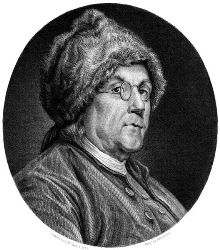
Benjamin Franklin, the great scientist of his day and America’s Ambassador to the Court of Versailles, held a somewhat different opinion of privateers and did indeed form his own private navy around them. Franklin wasn’t interested in raising money from the spoils privateers captured though. He needed prisoners and he needed these prisoners because Great Britain held thousands of Americans in brutal, barbaric conditions.
The British military considered American prisoners to be rebels, traitors against the king, and men who would all hang after the rebellion was crushed. Captured rebels were not prisoners of war entitled to civil treatment, so the British military (and most members of Parliament) had little concern for their welfare. American prisoners were starved, denied medicines, beaten, and even killed. Just how bad was the plight of American prisoners? During the war, Americans suffered roughly 4,300 battlefield deaths compared to 13,000 Americans who died while in British custody.
Franklin agonized over the horrible mistreatment of his fellow countrymen and wanted to help ease their sufferings. But he needed leverage. He needed British prisoners to force Parliament into agreeing to prisoner-of-war exchanges. |
|
| Back to top |
|
 |
Salty Dog

Sailing Master 
Posts: 10060 



191991 Gold -

|
 Posted: Thu Dec 21, 2017 5:27 pm Post subject: Posted: Thu Dec 21, 2017 5:27 pm Post subject: |
 |
|
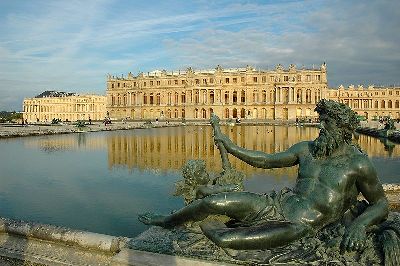
The Palace of Versailles in France
Captain Luke Ryan
In the spring of 1779, the Americans were losing their life-and-death struggle against Great Britain for independence, and were losing badly. Their rag-tag army was in retreat. Their small navy had been swept from the seas. Congress was in a panic. The fate of a fragile nation, the fate of the Revolution, was hanging by a thread. Prospects looked very grim for the rebels.
Meanwhile, across the ocean, the twenty-five (or so)-year-old Ryan and his Irishmen were indifferent to the war. They ran a profitable operation, smuggling French brandy, Dutch tea, arms, and other assorted materials between Dunkirk and Dublin.1 Ryan was the master of the fastest ship on the water, too, named Friendship.2
Life was good until February 19, 1779, when the British revenue service (the coast guard of the period) captured Ryan’s vessel and crew off Dublin. The British impounded Ryan’s ship and cargo at Poolbeg and tossed his men into Dublin’s infamous Black Dog. Ryan, who had been in Dublin at the time, escaped capture. Unwilling to accept defeat, he hired more men, broke his crew out of jail, and then retook his ship in a daring midnight raid. In doing so, the Irishmen had committed an act of piracy and would hang for it if caught.
Their smuggling days were over. Ryan and his men needed sanctuary and set sail for France where, Ryan had heard, the Americans were looking to hire privateers. Once they reached France, he converted Friendship from a smuggler into a warship, renamed her Black Prince, and approached Franklin for a privateering commission. But Franklin didn’t trust the Irishman and sent him away empty-handed.
Undeterred, Ryan hired a down-on-his-luck, unemployed, American ship’s captain, marooned in Paris, named Stephan Marchant. Ryan sent Marchant to Franklin to apply for a commission in Marchant’s name as captain of the Black Prince. Unaware he was being duped by Ryan, Franklin reluctantly agreed to give Marchant and his mostly Irish crew a commission on May 19, 1779.3 And so, an unlikely alliance was formed between the world’s most famous and preeminent scientist, who needed fighting sailors, and an Irish punk, who was on the run from the British gallows and needed a new nationality. |
|
| Back to top |
|
 |
Salty Dog

Sailing Master 
Posts: 10060 



191991 Gold -

|
 Posted: Thu Dec 21, 2017 5:28 pm Post subject: Posted: Thu Dec 21, 2017 5:28 pm Post subject: |
 |
|
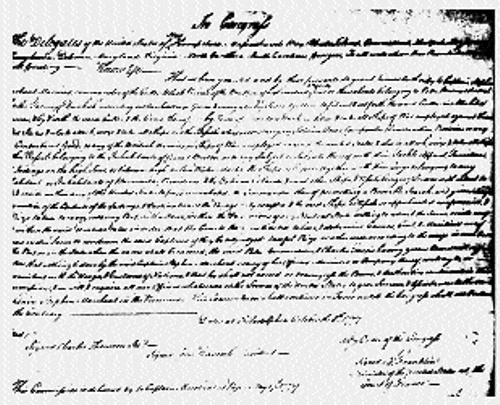
Privateering commission Benjamin Franklin granted to Stephan Marchant of the Black Prince in 1779
For nearly two years, Ryan and his Irishmen, with three fast, heavily armed cruisers (the Black Prince, the Black Princess, and the Fearnot) did considerable damage to British shipping and terrorized British subjects. Before the Irishmen were finished, they had captured or destroyed over 100 British ships, won numerous engagements against British warships, took hundreds of prisoners for Franklin, and invaded a number of English and Scottish towns at will. They tied up precious British military resources – militias had to be stationed along the coast and as many as forty British frigates were trying to hunt Ryan down at different times. Perhaps even worse, his victories created a financial panic in London as merchant ships refused to sail and maritime insurance rates skyrocketed.
Ryan’s reign of terror abruptly came to an end on April 17, 1781, after he was captured off the coast of Scotland while in command of the French frigate, Calonne.4 He took the brig Nancy as a prize off St. Abb’s Head, Scotland. Soon after, he ran into the powerful 74-gun HMS Berwick and her escort, the frigate Belle Poule. Severely outgunned and pinned against the coast, Ryan was forced to surrender. The Edinburgh Courant reported the incident on the following day:
Yesterday morning, about two o’clock, the Berwick man-of-war fell in with Le Calonne, privateer of Dunkirk, the noted Luke Ryan commander, four miles off St Abb’s Head. The Calonne struck at half-past eight. Ryan is now in irons. His crew are a mixture of French, Yankies, Scotch, Irish and a solitary Dutchman, who was pilot. |
|
| Back to top |
|
 |
Salty Dog

Sailing Master 
Posts: 10060 



191991 Gold -

|
 Posted: Thu Dec 21, 2017 5:29 pm Post subject: Posted: Thu Dec 21, 2017 5:29 pm Post subject: |
 |
|
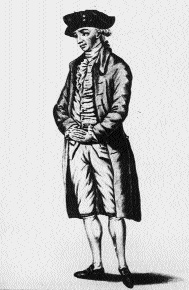
For nearly two years, Ryan and his Irishmen, with three fast, heavily armed cruisers (the Black Prince, the Black Princess, and the Fearnot) did considerable damage to British shipping and terrorized British subjects. Before the Irishmen were finished, they had captured or destroyed over 100 British ships, won numerous engagements against British warships, took hundreds of prisoners for Franklin, and invaded a number of English and Scottish towns at will. They tied up precious British military resources – militias had to be stationed along the coast and as many as forty British frigates were trying to hunt Ryan down at different times. Perhaps even worse, his victories created a financial panic in London as merchant ships refused to sail and maritime insurance rates skyrocketed.
Ryan’s reign of terror abruptly came to an end on April 17, 1781, after he was captured off the coast of Scotland while in command of the French frigate, Calonne.4 He took the brig Nancy as a prize off St. Abb’s Head, Scotland. Soon after, he ran into the powerful 74-gun HMS Berwick and her escort, the frigate Belle Poule. Severely outgunned and pinned against the coast, Ryan was forced to surrender. The Edinburgh Courant reported the incident on the following day:
Yesterday morning, about two o’clock, the Berwick man-of-war fell in with Le Calonne, privateer of Dunkirk, the noted Luke Ryan commander, four miles off St Abb’s Head. The Calonne struck at half-past eight. Ryan is now in irons. His crew are a mixture of French, Yankies, Scotch, Irish and a solitary Dutchman, who was pilot.
It is, however, hard to imagine how a man like Ryan could have mistaken a large, Royal Navy, Third Rate ship of the line -- a 74-gun two-decker with bright yellow gun bands -- for a whaler. Consider, too, that Berwick and Belle Poule sailed for Edinburgh to join the North Sea fleet. They were not out looking for privateers and just happened upon Calonne, so it seemed improbable that the British had enough time to disguise either ship to try and fool Ryan.5 |
|
| Back to top |
|
 |
Salty Dog

Sailing Master 
Posts: 10060 



191991 Gold -

|
 Posted: Thu Dec 21, 2017 5:29 pm Post subject: Posted: Thu Dec 21, 2017 5:29 pm Post subject: |
 |
|
Temporarily taken in chains to Edinburgh Castle, Ryan was later moved to London to be tried for treason and piracy on March 30, 1782. Luke’s nationality became a critical issue in his trial.6 The Crown prosecutor produced a parish registry that recorded Ryan’s birth on February 14, 1750 (or so) in Rush, Ireland to a Michael and Mary Ryan of Kenure. Ryan’s attorney countered with a registry from the Curate of Gravelines, France that showed Ryan was, in fact, born in Gravelines to a Joseph and Mary Ryan.7 If Luke was born in Ireland, as the Crown maintained, he was a British subject and all his actions against the Crown constituted treason and piracy and Franklin's commission couldn’t save him. If, on the other hand, Ryan was born in France, he would be considered a French subject, free to wage war against Great Britain.

Following the lengthy and much publicized trial, Ryan was convicted of both piracy and treason and sentenced to hang. Four times the British set his execution date, and four times Ryan prepared himself for death. But his execution was postponed on each occasion. Eventually, through the efforts of one of his ardent admirers, Ryan’s life was spared. Who was this admirer? The Queen of France, Marie Antoinette, pled for Ryan’s life, asking King George to show mercy. The King of England was sufficiently moved by her request and reduced Ryan’s death sentence to life imprisonment.
According to official British reports, Ryan was released from prison after the war. He died in the King’s Bench Prison, a debtors’ prison in London, at the approximate age of thirty-nine, for failing to pay a doctor for inoculating his three children against smallpox. On June 18, 1789, The Gentleman’s Magazine – under “Obituary of considerable Persons; with Biographical Anecdotes” on page 578 – reported that Ryan died from blood poisoning in.
In the King’s Bench prison, Luke Ryan, captain of the Black Prince privateer during the war, who captured more vessels belonging to Great Britain than any other single ship during the war. The various scenes he went through are astonishing. He sailed firm the port of Rush, in Ireland, early in the year 1778, in the Friendship, a smuggling cutter of 18 six-pounders, whose name he afterwards changed to the Black Prince, and did more injury to the trade of these kingdoms than any single commander ever did. He was taken in 1781 by one of our ships of war, tried as a pirate at the Old Bailey, condemned, and four different times ordered for execution, but reprieved; and on peace being made, obtained his pardon through the Court of France. In 1781 he had realized near 20,000l. by his piracies, and lodged this sum in his bankers hands; but having trusted a woman passed her on them as his wife, they suffered her to draw the whole out on his conviction, and she defrauded him of every shilling.
Some in France, though, claimed this report was a hoax, that he did not die in prison, but rather returned to France after the war and lived out his years serving in the French navy.
Could the British reports be wrong? Or could Ryan have faked his own death and, if he did, why would he do such a thing? We will probably never know the truth of it. |
|
| Back to top |
|
 |
Salty Dog

Sailing Master 
Posts: 10060 



191991 Gold -

|
 Posted: Thu Dec 21, 2017 5:30 pm Post subject: Posted: Thu Dec 21, 2017 5:30 pm Post subject: |
 |
|
Final Thoughts
How did a twenty-five-year-old Irish smuggler – a common thief and person with no formal military training that we know of – accomplish so much against the world’s most powerful navy (and in its own home waters)? The answer remains a mystery. Ryan’s successes – successes that stagger the imagination – cannot be easily explained.
An equally intriguing question is: What motivated Ryan and his Irishmen to risk life and limb for the Americans? At first, they sailed for prize money, true. But Ryan and his men never saw any of the money. Their French investors either squandered it or stole it, yet Ryan and his Irishmen continued to attack the British over and over again, determined to inflict as much harm on them as they could.
Interesting questions . . . .
Certainly Ryan was not only a gifted sailor and master tactician, in light of the unswerving devotion of his men, but also an extraordinary and inspiring leader. This much we do know: Ryan and his Irishmen were true heroes. They were true American patriots.
Still dubious about the contribution of American privateers?
The results speak for themselves. When the war began, America had no navy and by 1777, the Continental Navy had only thirty-four cruisers in service. By 1782, this number had dwindled to a mere seven serviceable ships. Privateers were used to augment this meager force and before the war’s end, tens of thousands of men in hundreds of privateers ventured into hazardous waters against the most powerful navy in the world. They sank or captured 2,283 enemy vessels (compared to the Continental Navy, which captured or destroyed 196 enemy ships in total). After the war’s end, the British Admiralty reported to the House of Lords that American privateers had cost the British merchant navy more than £8 million in damages.
Franklin’s privateers were responsible for 114 of those victories. The Black Prince took thirty-five enemy vessels, Black Princess forty-three, and Fearnot sixteen. The Prince and the Princess sailing together took another twenty. A number of other British ships were damaged or forced to stay in port. Hundreds of prisoners were taken, an unknown number of British seamen were killed or wounded, and the British employed a large number of ships and soldiers to catch Ryan. Impressive numbers by any measure. |
|
| Back to top |
|
 |
Salty Dog

Sailing Master 
Posts: 10060 



191991 Gold -

|
 Posted: Thu Dec 21, 2017 5:30 pm Post subject: Posted: Thu Dec 21, 2017 5:30 pm Post subject: |
 |
|
Notes:
1. The English had imposed hefty taxes on brandy and tea, which meant these items fetched handsome profits for the smugglers.
2. The Friendship was probably a forerunner of the Baltimore clipper class.
3. As America’s Minister Plenipotentiary to France, Benjamin Franklin was authorized to issue privateering commissions, or letters or marque, as long as France raised no objections. Stephen Marchant of Boston, the Prince’s captain, was nothing more than a cat’s paw. Ryan remained the true master of the Prince.
4. Ryan’s reign of terror lasted nearly two years, but his capture may have been the result of a double-cross. There is a whiff of evidence that French treachery was at least partially involved in Ryan’s capture. We will perhaps never know the whole truth of it. There is no question, though, that the French government wanted to put an end to Franklin’s privateering and certainly Captain Guilman’s attack on the Black Prince, an allied ship, in view of several thousand witnesses near Berck, was bizarre to say the least.
5. As an interesting aside, Ryan supposedly was in command of a French privateer named Tartar prior to Calonne and managed to capture an unnamed British frigate sometime in late 1780 (as reported in the January 6, 1781, edition of Finn’s Leinster Journal published in Kilkenny, Ireland).
6. Ryan was tried at the Old Bailey Courthouse, the same courthouse where William Kidd was tried and convicted of murder and piracy eighty years earlier. Ryan’s trial was reported in the April issue of Thomas Walker’s Hibernian Magazine or Compendium of Entertaining Knowledge.
7. At the time, Joseph Ryan served in France’s Dillon Regiment as a lieutenant. |
|
| Back to top |
|
 |
|
|
You cannot post new topics in this forum
You cannot reply to topics in this forum
You cannot edit your posts in this forum
You cannot delete your posts in this forum
You cannot vote in polls in this forum
|
Powered by phpBB © 2001, 2005 phpBB Group |
|















